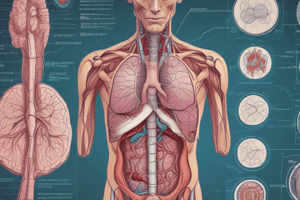Podcast
Questions and Answers
¿Qué dirección anatómica se refiere a la parte delantera del cuerpo?
¿Qué dirección anatómica se refiere a la parte delantera del cuerpo?
- Anterior (correct)
- Inferior
- Lateral
- Posterior
¿Qué palabra raíz se relaciona con la sangre?
¿Qué palabra raíz se relaciona con la sangre?
- Osteo-
- Gastro-
- Neuro-
- Hemo- (correct)
¿Cuál es el nombre de la cavidad corporal que contiene los órganos digestivos?
¿Cuál es el nombre de la cavidad corporal que contiene los órganos digestivos?
- Abdominal cavity (correct)
- Cranial cavity
- Pelvic cavity
- Thoracic cavity
¿Qué prueba diagnóstica se utiliza para medir la actividad eléctrica del corazón?
¿Qué prueba diagnóstica se utiliza para medir la actividad eléctrica del corazón?
¿Qué especialidad médica se enfoca en el estudio de los huesos y sus enfermedades?
¿Qué especialidad médica se enfoca en el estudio de los huesos y sus enfermedades?
¿Qué dirección anatómica se refiere a la parte más cercana al punto de Attachment?
¿Qué dirección anatómica se refiere a la parte más cercana al punto de Attachment?
¿Qué palabra raíz se relaciona con el estómago?
¿Qué palabra raíz se relaciona con el estómago?
¿Qué prueba diagnóstica se utiliza para examinar tejidos bajo un microscopio?
¿Qué prueba diagnóstica se utiliza para examinar tejidos bajo un microscopio?
Flashcards are hidden until you start studying
Study Notes
Health Sciences Terminology
Anatomical Directions
- Anterior: towards the front of the body
- Posterior: towards the back of the body
- Superior: towards the head
- Inferior: towards the feet
- Medial: towards the midline of the body
- Lateral: away from the midline of the body
- Proximal: closer to the point of attachment
- Distal: farther from the point of attachment
Body Cavities
- Cranial cavity: contains the brain
- Thoracic cavity: contains the heart and lungs
- Abdominal cavity: contains the digestive organs
- Pelvic cavity: contains the reproductive organs
Word Roots and Prefixes
- Cardio-: related to the heart
- Neuro-: related to the nerves or nervous system
- Hemo-: related to the blood
- Osteo-: related to the bones
- Gastro-: related to the stomach
Diagnostic Tests
- Endoscopy: visual examination of internal organs using a flexible tube
- Biopsy: examination of tissue samples under a microscope
- Electrocardiogram (ECG): measures the heart's electrical activity
- Imaging tests: X-ray, CT, MRI, and ultrasound scans
Medical Specialties
- Cardiology: study of the heart and its diseases
- Neurology: study of the nervous system and its diseases
- Orthopedics: study of the musculoskeletal system and its diseases
- Oncology: study of cancer and its treatment
Ciencias de la Salud: Terminología
Direcciones Anatómicas
- Anterior: hacia la parte frontal del cuerpo
- Posterior: hacia la parte posterior del cuerpo
- Superior: hacia la cabeza
- Inferior: hacia los pies
- Medial: hacia la línea media del cuerpo
- Lateral: alejado de la línea media del cuerpo
- Proximal: más cerca del punto de unión
- Distal: más lejano del punto de unión
Cavidades Corporales
- Cavidad craneal: contiene el cerebro
- Cavidad torácica: contiene el corazón y los pulmones
- Cavidad abdominal: contiene los órganos digestivos
- Cavidad pélvica: contiene los órganos reproductivos
Raíces y Prefijos de Palabras
- Cardio-: relacionado con el corazón
- Neuro-: relacionado con los nervios o sistema nervioso
- Hemo-: relacionado con la sangre
- Osteo-: relacionado con los huesos
- Gastro-: relacionado con el estómago
Pruebas Diagnósticas
- Endoscopía: examen visual de órganos internos mediante un tubo flexible
- Biopsia: examen de muestras de tejido bajo el microscopio
- Electrocardiograma (ECG): mide la actividad eléctrica del corazón
- Pruebas de imagen: radiografías, tomografías computarizadas, resonancia magnética y ecografías
Especialidades Médicas
- Cardiología: estudio del corazón y sus enfermedades
- Neurología: estudio del sistema nervioso y sus enfermedades
- Ortopedia: estudio del sistema musculoesquelético y sus enfermedades
- Oncología: estudio del cáncer y su tratamiento
Studying That Suits You
Use AI to generate personalized quizzes and flashcards to suit your learning preferences.




